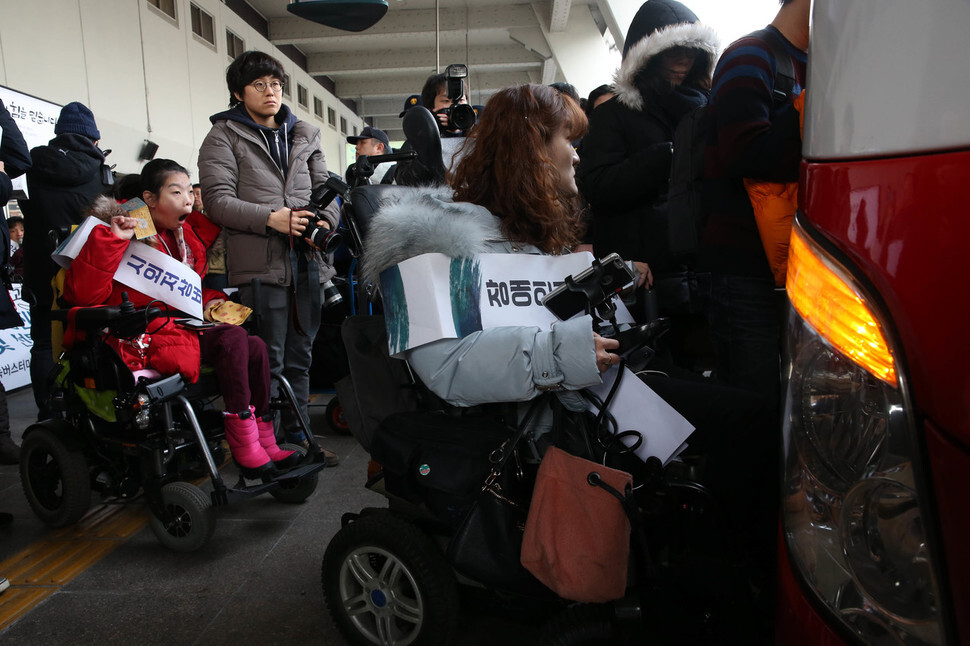hankyoreh
Links to other country sites 다른 나라 사이트 링크
Over Lunar New Year holiday, wheelchair bound travelers still can’t board buses

“Disabled customers who wish to board with their wheelchairs are not being offered transportation services due to various conditions concerning express bus vehicles and travel.”
The message appears to travelers who access the National Express Bus Transportation Association (KOBUS) home page ahead of the Lunar New Year holiday.
“The express bus industry is making continued efforts to address this issue and requests your understanding,” it concludes. KOBUS posted the same announcement during major holidays last year.
South Korea has some 9,500 express and intercity buses operating nationwide. None have wheelchair boarding equipment installed. Folding wheelchairs can be folded up and stored in the baggage compartment, but those with motorized wheelchairs have no means of boarding.
“The announcement about there not being ‘buses that wheelchair users can use’ has been posted on the homepage for the past several years,” KOBUS explained.
“To make and operate buses that disabled people can use, we need government support,” it added.
The Ministry of Land, Infrastructure and Transport’s Korea Transportation Safety Authority only announced its plan to research a standard model for improved express and intercity buses in November of last year. The key aim of the study is to acquire improvement technology for buses with boarding equipment for wheelchairs measuring 130 cm in length and 70 cm in width and weighing 275 kg with their users. But the research period alone, which starts in 2017, is expected to last three years.
KOBUS introduced premium express buses around November 2016. Next to the announcement about being unable to accommodate wheelchairs is another about the premium express bus service.
“Experience the best express buses in Korea,” it reads. “A wide range of amenities available, including state-of-the-art safety equipment, comfortable sheets and spaces of your own, and private monitors, tables, and books for all seats. Movies, TV shows, and other contents also available.”
But those buses also lack wheelchair boarding equipment. While KOBUS is capable of making premium express buses, it can’t make buses that accommodate wheelchair users.
The group Solidarity Against Disability Discrimination (SADD) held a press conference at Seoul’s Gangnam Express Bus Terminal on Jan. 26 to call for guarantees on intercity travel for mobility-disadvantaged transportation users. The press conferences have been taking place for three years now.
One of the participants was Park Gyeong-mi, 43, who was diagnosed with a Level 1 brain injury due to a sudden bout with high fever when she was a child.
“Disabled people also want to travel and go home by bus, and it would be nice if they could,” she told the Hankyoreh in a telephone interview.
Park’s wish is to be able to take the bus to Gangwon Province or Tongyeong, South Gyeongsang Province, to see the ocean.
Enacted in Jan. 2006, the Act on Promotion of the Transportation Convenience of the Mobility Disadvantaged states that disabled persons and others with mobility disadvantages “must be able to use all means of transportation available to non-disadvantaged persons without discrimination.”
By Park Soo-jin, staff reporter
Please direct questions or comments to [english@hani.co.kr]

Editorial・opinion
![[Column] Season 2 of special prosecutor probe may be coming to Korea soon [Column] Season 2 of special prosecutor probe may be coming to Korea soon](https://flexible.img.hani.co.kr/flexible/normal/500/300/imgdb/original/2024/0426/3317141030699447.jpg) [Column] Season 2 of special prosecutor probe may be coming to Korea soon
[Column] Season 2 of special prosecutor probe may be coming to Korea soon![[Column] Park Geun-hye déjà vu in Yoon Suk-yeol [Column] Park Geun-hye déjà vu in Yoon Suk-yeol](https://flexible.img.hani.co.kr/flexible/normal/500/300/imgdb/original/2024/0424/651713945113788.jpg) [Column] Park Geun-hye déjà vu in Yoon Suk-yeol
[Column] Park Geun-hye déjà vu in Yoon Suk-yeol- [Editorial] New weight of N. Korea’s nuclear threats makes dialogue all the more urgent
- [Guest essay] The real reason Korea’s new right wants to dub Rhee a founding father
- [Column] ‘Choson’: Is it time we start referring to N. Korea in its own terms?
- [Editorial] Japan’s rewriting of history with Korea has gone too far
- [Column] The president’s questionable capacity for dialogue
- [Column] Are chaebol firms just pizza pies for families to divvy up as they please?
- [Column] Has Korea, too, crossed the Rubicon on China?
- [Correspondent’s column] In Japan’s alliance with US, echoes of its past alliances with UK
Most viewed articles
- 1Samsung subcontractor worker commits suicide from work stress
- 2‘We must say no’: Seoul defense chief on Korean, USFK involvement in hypothetical Taiwan crisis
- 3[Editorial] Korea’s surprise Q1 growth requires objective assessment, not blind fanfare
- 4Division commander ordered troops to enter raging flood waters before Marine died, survivor says
- 5Is Japan about to snatch control of Line messenger from Korea’s Naver?
- 6No good, very bad game for Korea puts it out of Olympics for first time since 1988
- 7US overtakes China as Korea’s top export market, prompting trade sanction jitters
- 8N. Korean delegation’s trip to Iran shows how Pyongyang is leveraging ties with Moscow
- 9Korea’s 1.3% growth in Q1 signals ‘textbook’ return to growth, says government
- 10[Column] Season 2 of special prosecutor probe may be coming to Korea soon